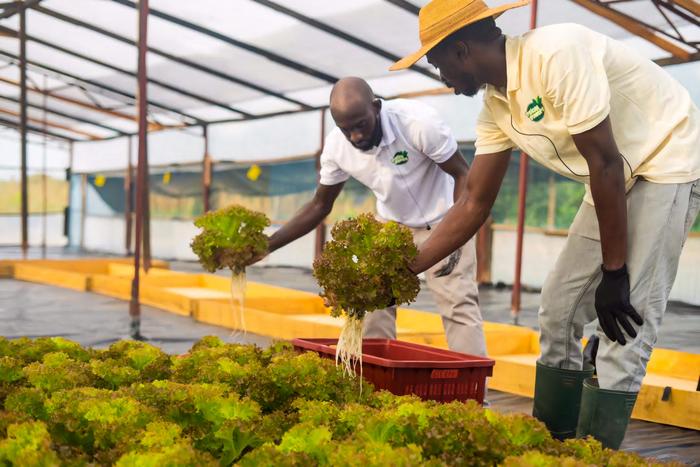Aston University researchers are to use AI to help increase the number and range of different crops grown in Ghana by developing real time monitoring systems.

Credit: Tropical Growers
- Aston University is to help increase crop production in Ghana
- The University has entered a knowledge transfer partnership (KTP) with Tropical Growers, a Ghanaian fruit and vegetable producer
- Currently the country imports around £1147m of fruit and vegetables annually.
Aston University researchers are to use AI to help increase the number and range of different crops grown in Ghana by developing real time monitoring systems.
Due to its climate, the country has to import around £1147 million of fruit and vegetables annually. The University has entered a knowledge transfer partnership (KTP) with Tropical Growers, a company which cultivates plants in a nutrient solution, without soil, also known as ‘hydroponics’.
As well as reducing the amount of water needed, the technique allows production of a greater range of crops than Ghana’s traditional ‘open field’ farming, such as salad and fruit.
A KTP is a three-way collaboration between a business, an academic partner and a highly qualified researcher, known as a KTP associate. The UK-wide programme helps businesses to improve their competitiveness and productivity through the better use of knowledge, technology and skills. Aston University is a sector leading KTP provider, with 80% of its completed projects being graded as very good or outstanding by Innovate UK, the national body.
Tropical Growers currently needs to develop a digital platform for plant health monitoring so it can make sure its plants are cultivated in the best possible environment. It needs a system integrated with an evaporative cooling system, so that plants can withstand Ghana’s extreme summer temperatures. It also needs it to function via an AI framework to allow automatic, continuous micro-adjustments to the plants’ nutrition, temperature and humidity.
The Aston University team will create a system of devices, including cameras, humidity monitors and tiny weather-stations, which will monitor and control the environment inside a Tropical Grower’s greenhouse.
The network will collect and analyse data, including real-time images of the crops, and will ultimately communicate with the evaporative cooling system, which itself will be powered by solar energy. A phone app will be developed to estimate crops’ water and nutrient requirements, as well as for predicting the yield.
Aston University’s team comprises Dr Muhammad Imran and Dr Umar Manzoor. Dr Imran is a senior lecturer in mechanical, biomedical and design who specialises in research into innovative thermal energy systems and recently devised a novel solar-powered pre-cooling food storage system for smallholder farmer clusters in Nigeria.
Meanwhile Dr Umar Manzoor’s research interests lie in agent-based simulation and modelling, machine learning, artificial intelligence and autonomous systems. His expertise will be particularly useful in guiding the data collection and subsequent analysis, as well as the development of an interface and mobile phone application for the system.
They will be collaborating with Dr Tabbi Wilberforce Awotwe, a lecturer in engineering at Kings College London, who has previously conducted research at Aston University.
Dr Imran said: “We aim to develop a ‘plug and play’ monitoring system. Our goal is to design software and algorithms and integrate various components so that the system is incredibly user-friendly for farmers. It should also be adaptable, allowing farmers to easily adjust its scale according to their needs.
“Our aim is not only to assist this company but also to provide them with technology that they can market to other farmers.”
Being able to reduce temperatures by just a few degrees will make a considerable difference to crop health and to the varieties that can be grown. For example, celery and strawberries are in demand from customers but have always been impossible to grow in the heat until now. Tropical Growers will also be better able to predict its crop yields, which will lead to greater efficiency and certainty of supply for customers.
Prince Akwanda, chief technical officer for Tropical Growers, said: “The complexity of this project is in making the different systems communicate with each other, and we need that expertise in creating a single environment.
“It’s not possible for people to watch plants 24 hours a day, so we believe this KTP project is a dream come true for us, as it will not only lead to better, healthier crops, but help us predict our supply.”
The monitoring system itself will be developed as a product package that can be sold to other farmers interested in hydroponic farms, creating a new income stream for Tropical Growers. The company is keen for Ghanaian farmers to realise the benefits of hydroponic cultivation to help reduce the huge amount of fruit and vegetables that have to be imported each year.
The project will also involve Dr Richard Opuku and Dr Henry Nunoo Mensah from Kwame Nkrumah University of Science and Technology (KNUST) in Kumasi, Ghana.
Dr Opoku, who specialises in energy efficiency, renewable energy and climate change research, will be the academic supervisor responsible for the design of the new greenhouse and the design of its cooling system. He said:
“As well as enabling Ghana’s hydroponics companies to manage the growth of a plant from start to finish, we ultimately want to produce an academic paper from this project focusing on the research carried out. We presently train electronic engineers at KNUST, and the lessons we will take from this KTP will also help us refine our course materials.”
Dr Opoku will also oversee KTP Associate Akwasi Owusu Afriyie, who will be working at the Tropical Growers’ site in southern Ghana, delivering technical training and workshops to ensure company staff understand how to operate the system.
The KTP is expected to end in December 2025.



